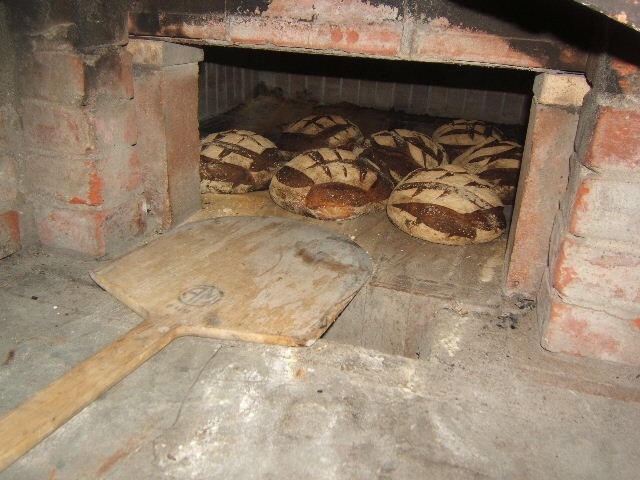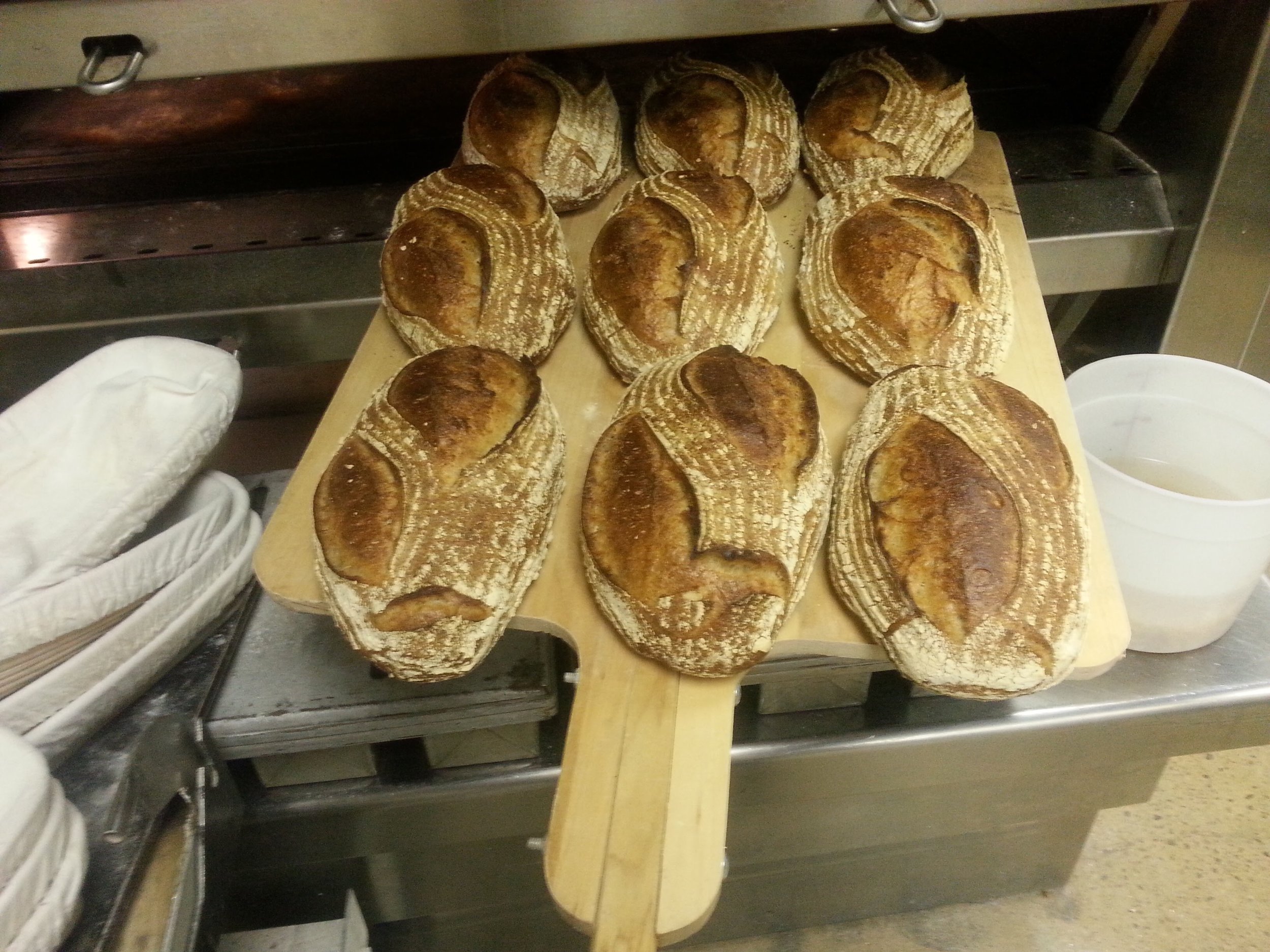The art of baking bread: An interview
““Good bread is the most fundamentally satisfying of all foods; and good bread with fresh butter, the greatest of feasts.” - James Beard”
It’s 2:00 a.m. on a Tuesday morning and everything is quiet in the back of a small bakery in the Cliffcrest neighbourhood of Scarborough, Ontario. David Aplin, the owner and baker arrives to begin work, hours before the rest of us will even begin to stir in our beds. He puts on a pot of espresso, turns on the oven and gets to work. By 7:00 a.m. the air is thick with flour and curses as dough is mixed, fermented and formed into loaves, all by hand.
By 8:00 a.m. the end is in sight for David, as his wife and business partner, Camelia arrives to take over at the front and prepare to open the doors to a hungry public at 9:00 a.m.
The shop is Cliffside Hearth Bread Company and they’re one of the few bakeries left doing things the old-fashioned way, without commercial equipment and with a focus not on sweets, but on bread – honest-to-goodness, crusty on the outside, fluffy on the inside, bread.
I had the opportunity to chat with David and hear first-hand how Cliffside Hearth came to be the reliable, small batch bakery supplying Toronto’s east end with the best sourdough (in my opinion) around. Like so many great ventures, it was born out of necessity.
Photo c/o Cliffside Hearth
C&C: Tell me about your background and what led you to becoming a baker.
DP: I didn’t really chose baking, it chose me. Growing up I wanted to be a rock star and I actually played in heavy rock and metal bands for a number of years, but by the time I was around 30 I realized I needed to find a stable day job. I was living in Toronto looking for work, and I came across an opening at a bakery called Confectionately. They were looking for an assistant to help out and I got the job. After that, I bounced around different pastry shops all over Toronto and wound up working at Loblaws as a night baker where I stayed for 25 years.
C&C: What led you from Loblaws to opening your own business?
DP: I started baking sourdough breads at home as a hobby. I would leave my job at Loblaws, where I was mainly decorating cakes to come home and start making sourdough. My son was around two-years-old at the time and liked munching on them. I picked up a book on wood-fired ovens called The Bread Builders, and that really set me off. I spent all of 2005 building a wood-fired oven in our backyard armed with only a book and some plans to guide me.
Photo c/o Cliffside Hearth
One day, a woman at my son’s school approached me and said she would pay me if I could bake bread for her in our oven, and that was the beginning of a side business. There was some buzz around the neighbourhood and eventually I ended up spending the school year baking bread for around 100 subscribers once every two weeks in the hours between my day job. I ended up renovating our basement to add a large kitchen to keep things going, and that lasted from 2005 to 2010.
We then got a couple of wholesale clients, The Big Carrot and The Butcher Shoppe and that’s when we started to think we could do this full time. Camelia ran a restaurant downtown for years and we had talked about opening a business together, but I didn’t want to get into the restaurant business because I knew from her experience what that’s like, so when the bread baking took off, that made the decision for us.
Photo c/o Cliffside Hearth
C&C: What made you decide on the Cliffcrest neighbourhood for your bakery?
DP: A lot of my family lives in the area, so I was familiar with it. We looked around downtown in some of the trendier areas, but we wanted something we could easily walk or cycle to and we found this great spot in a plaza on Kingston Road. We’re not part of the downtown culinary scene at all, but bakeries are destination places. People will come from all over to visit them.
C&C: Why is it important to you to use traditional, manual techniques for bread baking?
DP: It was actually driven by necessity. We didn’t have a lot of money and couldn’t afford to buy a commercial quality bread mixer, so that’s why I built the oven in our backyard and started with that. Now we have a stand mixer, a couple of hand mixers and the oven – that’s it. I’m not religious about it, and I understand why the bread baking industry has embraced mechanical technology. I’m at the bakery seven days a week and it’s back-breaking work. Bakers used to wear themselves to death by age 30 and there’s nothing romantic about that. We started small, so in the beginning I was strictly mixing dough by hand, making batches of 50 loaves by hand and after a weekend of doing that you realize why most people don’t do it that way anymore.
Everything we have at Cliffside is ancient, single-speed stuff, except for a newer oven. It’s mainly out of habit because we learned on the job and that’s all we’ve ever really known, but there’s also a simple joy in crafting something by hand that’s not to be underestimated, it can give your life meaning.
You can still mechanize to a degree and call your product “handmade” and consider yourself an artisan. The truth is that the bread doesn’t know if it’s being manipulated by human or machine. If you can get a good product either way, I think that’s cool, and you can certainly save your body.
Photo c/o Cliffside Hearth
C&C: What are some of the challenges you’ve faced running the business?
DP: We’ve had a lot of challenges finding employees. Part of it has to do with the area we’re in because everyone wants to work downtown and be part of that scene. The other reason is a lack of real baking experience. We get resumes from lots of kids who say they have baking experience because they did baking at Tim Hortons or McDonalds or some of the larger companies, but those companies bring in everything from outside and most of the time the dough is frozen. They’re not making things from scratch and don’t have that skill. In Europe there’s a real tradition associated with being a baker and calling yourself that. For example, in France, to call yourself a boulangerie you have to show that you’re taking raw ingredients and making something out of them, but here we don’t have that, so anyone can call themselves a bakery. We ended up having luck finding some help through a partnership with Centennial College’s culinary program, and our son, Declan and his friend help out on the weekends as well.
Photo c/o Cliffside Hearth
C&C: Why did you chose to focus on bread as your main staple, as opposed to pastries or desserts?
DP: It started because I love making bread and there are very few places left that focus primarily on baking bread. Most bakeries around Toronto focus on desserts and that’s an easy sell – people love sugar, right? And cupcakes are everywhere. Haven’t we had enough of those yet?
Anyway, when we first opened, we sold only bread, buns and a few cookies, but we could see right off the bat that would not be enough. People expect some sweet goods, so we started making tarts and different pies, galettes, and jams, and that led to soups, garlic bread, quiche, tourtiere, and things like that. Bread is still our primary focus though. The sweets are Camelia’s department. She has completely taken over the desserts that we do make.
C&C: I’m always curious about what people who make food for a living eat when they’re at home. How much baking do you do for yourselves?
DP: We keep it really simple at home. We like to go to markets, pick up lots of veg, some meat and throw together simple meals on the fly. The most I bake at home is an easy cornbread recipe. At thanksgiving though we pull out all the stops, brining and cooking a big turkey and having the whole family over for dinner.
C&C: I find that the more you cook for yourself, the more critical you are when you eat out. Do you find that too?
DP: Yes! Absolutely. We went to Montreal this year for a vacation and ate at some great restaurants, but we’ve realized that we really prefer cooking for ourselves and we can make a lot of the same things at home.
C&C: What do your future plans for Cliffside Hearth look like?
DP: We’re in a 740 square foot shop right now. It’s small and that works well for what we do, but in an ideal world it would be cool to hand things over to another couple of partners who could maybe do something new with it, maybe open up a new location in the west end. The whole idea of a traditional mom and pop shop is romanticized these days, and originally it was just how people survived. It is a viable business model though and it would be neat to find some good people to pass things along to. For now though, we’re just taking it day by day. Our son has been helping out since he was a kid and has some good proficiency in the business, but he has his own interests to pursue.
Photo c/o Cliffside Hearth
C&C What advice would you give to someone going into the business?
DP: Make sure to have a business plan. We spent a lot of time arguing and working over ours and as soon as we opened the business we put it away in a drawer, but it gave us a roadmap for where to start and I don’t think we could have done it without that. I’m sure it would make for hilarious reading now.
After speaking to David, it’s clear that the old-school baking business is not for the faint of heart, which is why bakeries like Cliffside Hearth might be a dying breed. It’s easy to see why the shop feels like such a unique find that you almost don’t want to tell anyone about to keep it for yourself. It’s too special not to share though, and after all, that’s what breaking bread is all about. Don’t take my word for it though, go and see for yourself.
Details:
What to buy: Everything is good. The sourdough loaf is my favourite and the baguettes are gorgeous. Go earlier in the day if you can, as they do run out.
Hours: Cliffside Hearth is open Tuesday through Friday from 9:00 a.m. to 6:00 p.m. and Saturdays from 9:00 a.m. to 4:00 p.m. They’re closed Sundays and Mondays, though the baking prep never stops.
Location: You’ll find them at 3047 Kingston Road, at the east end of the Cliffcrest Plaza in Scarborough, ON.
Parking: Yes – it’s Scarborough.
Payment: They accept cash and debit, but not credit cards.
Social media:
Instagram: @cliffside_hearth_bread_company
Facebook: Cliffside Hearth Bread Company.
Twitter: @cliffsidehearth
Photo c/o Cliffside Hearth












